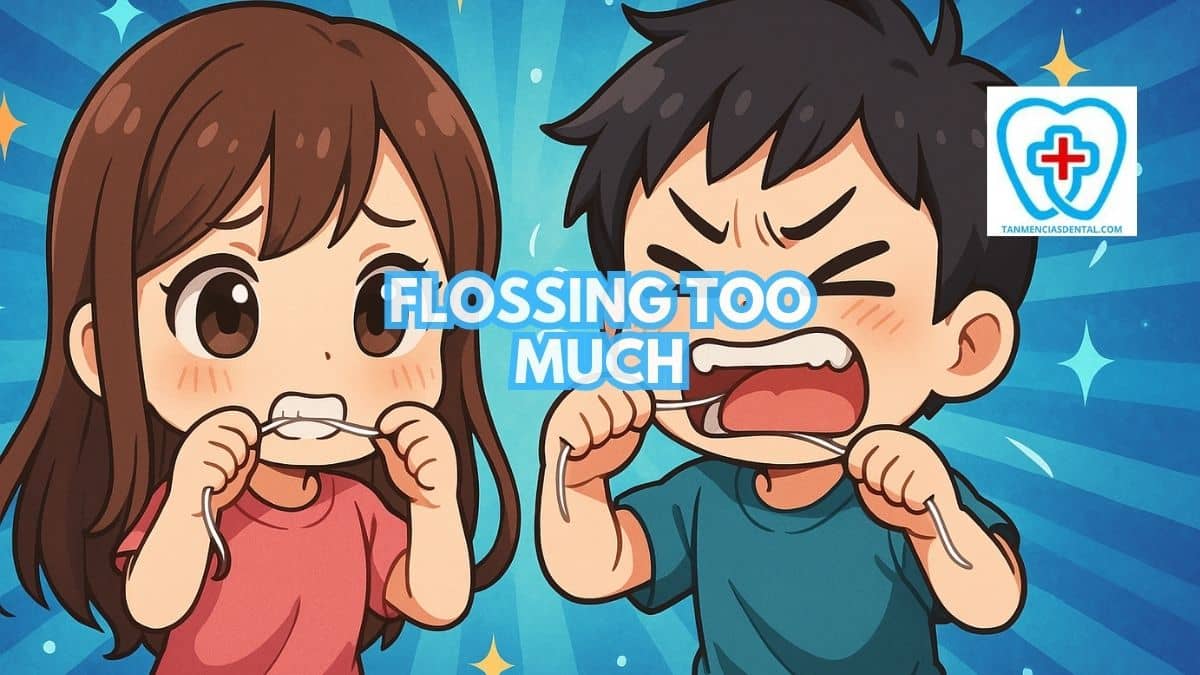Flossing is important for healthy teeth and gums, but doing it too often or too harshly can cause harm.
Some people think more flossing means better hygiene, but that’s not always true.
Over-flossing can injure soft tissues and wear down tooth surfaces.
It may lead to gum problems that could be avoided with proper care.
Knowing how much and how gently to floss can protect your mouth.
1. Gum Recession From Over-Flossing
Gum recession happens when the gum tissue pulls back from the tooth.
This often results from flossing too often or too aggressively.
Once gum tissue is lost, it usually doesn’t grow back on its own.
Exposed roots make your teeth more vulnerable to sensitivity and decay.
Recession can also affect how your smile looks and feels.
🦷 Does A Scale and Polish Whiten Your Teeth?
2. Enamel Wear Caused By Aggressive Flossing
Enamel is the hard outer layer that shields your teeth from damage.
Rough or frequent flossing can slowly wear this layer away, especially near the gumline.
Once enamel is lost, it doesn’t grow back.
This can lead to pain, especially when eating or drinking hot or cold items.
Using a gentle technique helps protect your enamel while still cleaning effectively.
3. Bleeding And Swollen Gums As Warning Signs
Bleeding gums during flossing can be a sign of irritation, not just poor hygiene.
Flossing too hard or too often can damage the delicate tissue.
Swelling and tenderness may follow, showing that the gums are inflamed.
These symptoms shouldn’t be ignored, even if flossing is meant to clean.
Pay attention to your gums’ reaction to avoid long-term harm.
🦷 How to Choose the Best Dental Clinic in Marikina for Your Family
4. Gum Cuts And Tissue Trauma
Forcing floss between your teeth can cause cuts in your gums.
These cuts can be painful and may bleed or become infected.
Repeated trauma can lead to lasting damage or even affect how your gums grow back.
Sometimes floss snaps into the gums, which makes the injury worse.
A slow, careful motion is safer for your gums.
🦷 How to Find the Cheapest Dental Implants Without Compromising Quality
5. Disruption Of Oral Bacteria Balance
A healthy mouth contains helpful bacteria that support good oral health.
Over-flossing can reduce these helpful microbes, upsetting the balance in your mouth.
This may allow harmful bacteria to grow faster.
An unbalanced mouth can lead to gum problems and more frequent cavities.
It’s important to clean without wiping out the good bacteria completely.
🦷 Why Does Dental Floss Have an Expiration Date?
6. Increased Risk Of Gum Disease
Flossing too much can weaken the protective barrier that gums provide.
Damaged or sore gums are more open to infection from bacteria.
This makes gum disease, like gingivitis, more likely to start and grow worse.
Gum disease can lead to tooth loss and other serious issues.
Keeping a gentle, limited flossing routine can help avoid this.
🦷 How Do Dentists Clean Your Teeth?
7. Tooth Sensitivity From Exposed Roots
When gums recede from over-flossing, tooth roots can become exposed.
These roots are very sensitive to cold, heat, and sweet foods.
Unlike enamel, roots are not well-protected and feel pain more easily.
This sensitivity can make eating and drinking uncomfortable.
Preventing gum loss through careful flossing helps keep roots covered.
🦷 How a Teeth Whitening Boutique Can Transform Your Smile in Just Days
8. Damage From Improper Floss Types Or Tools
Some flosses and tools can be too harsh for your mouth.
Thick, sharp, or textured floss may irritate your gums or scratch teeth.
Tools like plastic picks or metal sticks, when used the wrong way, can cut or bruise the gums.
Using something too big or hard for your teeth might not clean them well either.
Choosing soft, flexible floss is safer and more effective.
🦷 How Long Can I Eat After Wisdom Teeth Removal?
9. Once-Daily Flossing Is Enough
Flossing once a day is enough to clean between your teeth.
Doing it more often doesn’t give better results and can hurt your mouth.
Cleaning too much may strip away protective layers or damage gum tissue.
Most dental experts recommend daily flossing with proper care.
Consistency and gentleness are more helpful than frequency.
🦷 Do You Brush Your Teeth Before Or After Whitening Strips?
10. Importance Of Gentle Flossing Technique
Flossing should be done with care, not force.
Gently slide the floss between your teeth and wrap it around each tooth in a C-shape.
Move it up and down softly without hitting the gums.
This helps remove plaque without causing damage.
A patient and careful approach keeps your mouth clean and safe.
🦷 Affordable Dentistry Services in Marikina City
👨⚕️ Conclusion
Flossing is helpful, but only when done correctly and not excessively.
Too much flossing can damage your gums, wear down teeth, and upset the balance in your mouth.
Gentle, once-a-day flossing is usually enough.
Choosing the right tools and using a soft touch makes a big difference.
Protecting your mouth means knowing when enough is enough.
😊 Self-Promotion
Come visit us at Tan-Mencias Dental Clinic, located at 44 G. Del Pilar Street, Parang, Marikina City!
We’re here to help you keep your smile healthy and bright in a warm and friendly setting.
If you have any questions or want to set an appointment, you can call us at 9171451074.
You can also message us on our Facebook page or through the contact form on our website.
We’re excited to see you and take care of your dental needs!

